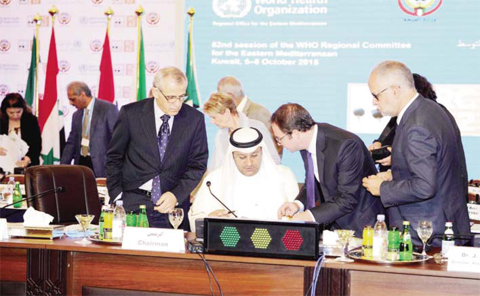 Kuwait’s Minister of Health Dr Ali Al-Obaidi during the 62nd session of the WHO Regional Committee for the Eastern Mediterranean. — KUNA photos
Kuwait’s Minister of Health Dr Ali Al-Obaidi during the 62nd session of the WHO Regional Committee for the Eastern Mediterranean. — KUNA photos
KUWAIT: Kuwait has incorporated psychological health into its network of primary care, said Kuwait's Minister of Health Dr Ali Al-Obaidi in a speech ending the 62nd session of the WHO Regional Committee for the Eastern Mediterranean, held here in Kuwait for the past four days.
Health Minister Dr Ali Al-Obaidi said health ministers in the Middle East Region discussed several issues in regards to important and emergent matters the region is facing. The meetings used to begin at 8am until 6pm, adding that such meetings are important in discussing issues and benefit from other nations experiences in health matters.
Al-Obaidi said several issues were discussed including the vaccinations plans, hepatitis-C, in addition to having the Saudi health minister present the latest on the "Middle East Respiratory Syndrome, Coronavirus (MERS), and how the Kingdom is facing it. The appearance of Cholera in Iraq and how authorities there are handling it. He said all topics were discussed in total transparency.
He said the regional office has three prizes, one for Dr Shousha, another in the name of Kuwait about cancer, heart and diabetes diseases and those were distributed, the third prize about "Down's Syndrome" was withheld until next year.
Al-Obaidi said five proposed decisions were reached and approved by heads of delegations. They are the final regional report for 2014, accounting for international health rules, following the political declaration issued by the United Nations in 2011 about non-infections chronic diseases in addition to two proposed decisions that directly concerns the doctor and patient continued medical education, and preparing a clear working plan for the Psychological health care in the regions countries. He said all five decisions were unanimously approved by those present.
Director of the Eastern Mediterranean region of WHO Dr Alaa Olwan said several recommendations and important decisions came out of the 62 meetings of the region held in Kuwait. He said there is a decision on the report presented by WHO E. Mediterranean region about the organization's activities for 2014 and 2015 that included recommendations on several important programs in the fields of strengthening health systems, health security and fighting infectious diseases.
Olwan explained that there is a very important decision on the health security and evaluating the abilities of the region's countries to prevent any type of infectious disease, adding that there are some negative results from Ebola virus in three countries of West Africa and its destruction of the health system, as well as its affect on the social and economic development and on the national security of these countries.
Olwan also said it is important to have all countries of the region ready and have the ability to prevent and remove the threat of these viruses and epidemics, adding that this decision will be implemented by all countries of the region in cooperation with WHO which cooperates with every country and conducts a comprehensive evaluation for all preparations for such health problems.
"The ministry is continuously in touch with citizens through mass media in order to report new statistics. In case of an outbreak of epidemic diseases, the ministry will immediately inform the WHO," he added. However, the minister warned of rumors and unofficial statements about the health situation in the country. On the 62nd Regional Committee for the Eastern Mediterranean Region of the World Health Organization (WHO) held here Tuesday, the minister said the conferees had discussed several health issues, chiefly medical treatment costs. They also addressed the subject of evaluating health technology and boosting the capacity of health systems through appropriate and effective methods to assess health technology and choose better health care, he noted.

